#torn between his wants and nature but ultimately didn't have a choice at all
Text
Discovery S5E1 first reactions (spoilers)
Every season, Star Trek's ugly duckling starts finding its footing a little better. I'm actually sad now its at its end.
I was prepared to be grumpy. For the first half hour or so, I was a little bit of a sourpuss. All the classic Discovery sins were on display in full force.
The main character syndrome. Burnham is leading from the front. Again. Didn't we have a whole season character arc about how captaining means sometimes you have to delegate?
Okay, okay, don't at me. The reasons for her to Kirk it up in the thick of things were reasonably well thought out.
I'm really torn between appreciating the whole "Iron Man" sequence in space as a smart, logical extrapolation of the technological development of the series and just being somewhat numb and feeling like the whole thing was rule of cool from start to finish.
They better not skimp out on Raynor's backstory and motives, because thus far every call he's made has been even more devoid of compassion as Captain Shaw, but critically none of his hard man making hard choices directives make sense. He's being set up as an Ahab type character.
Now this isn't the first time we've have a Starfleet Ahab. Ben Maxwell was just such a character. Critically though, he was a renegade that our hero characters were called in to hunt down like a mad dog precisely because, understandable motives or not, he was so far outside the bell curve for acceptable Starfleet standards for rules of engagement, compassion etc. that he was on the verge of provoking a war with the Cardassians.
A war that a lot of revisionist fans, mapping Cardassia and its ultimate alliance with the Dominion to Russia and the invasion of Ukraine, have come around to thinking a preventative war was good and cool, rather than risking an apocalypse. I've talked about this a few times, but the fact that the protomatter, temporal, isolytic, trilithium, biological etc. weapons haven't been deployed in quantity in the wars that have been depicted in Trek means everyone got damn lucky. Strange New Worlds has even seen fit to remind us that even with just conventional weapons, its not hard for casualties to run up into the millions given the scale of the civilizations butting heads.
But that's a rant for another time.
So Raynor being within spitting distance, if not wholly inside of the Section 31 anything for the mission mentality, is irksome. I'm probably not doing my due diligence by complaining without watching episode two yet, but still its a bad look. Its a nasty callback to depictions of casual jerkiness and military caricature from Picard's third season and Discovery's first.
Also I don't care about Burnham and Book’s relationship. I just don't. Nor am I particularly interested in Tilly finding love. They’re all fine and interesting characters without needing to inject relationship drama into the mix. This show has really started to feel like it doesn’t need to rely on cheap sources of melodrama. Finding love isn't the only pathway to character development. I don't watch this franchise for NCC-90210 storylines.
And I'm also a raging hypocrite because if anything happens to Saru and T'Rina, I will be even grumpier! Same with Culber and Stamets.
I may have a soft spot for warm, lived in, tender relationships and minimal patience for stories about relationship drama among the stars.
Also, I do appreciate that at least in the first episode, the Burnham - Book "ship" feels less overwrought. The awkwardness between them reads as a more mature, more nuanced incarnation of the relationship. Even when they inevitably patch things up, I really hope its less showy and melodramatic, and more cozy.
Grumpiness aside, I have to compliment the cast, writers, and crew enormously. This show has matured so impressively in the sense that the cast are able to find the characters in a natural and seamless way. The writers are putting better dialogue in their mouths even if I don't always necessarily want to see the specific storylines playing out.
Its a testament to the idea that art is a thing you practice and the human beings involved in producing this stuff need time and space to get it right. By legacy TV standards, Discovery is only just starting the equivalent of its third season. We used to talk about the two season rule for legacy Trek. The idea that it really only got good, not merely watchable if you have a good tolerance for cheese, but actually good in the third season.
The action sequences, mostly, were really good too. Well composed, clear and easy to follow while having a decent amount of drama and uncertainty to them.
The chase sequence really managed to capture the power and physics of having starships operating inside the atmosphere of a planet and what they can do. Although I'm sure the tech fans will froth at a number of obvious inconsistencies in scaling, at least we actually see some interesting consequences of ships interacting with planets.
Additionally it also accidentally portrays one of the world building problems with the version of the Star Wars universe depicted by the Attack of the Clones and Revenge of the Sith Incredible Cross Sections books. Yes, I'm one of those kinds of fans who has argued both sides of that particular controversy. I've always found Dr. Saxton's attempts to quantify just what is going on and then contrive explanations for how its possible fascinating, but ultimately it presents serious world building problems. Like the idea that one scoundrel with one relatively diminutive ship, like the Falcon or Slave I, could utterly wreck a populated area in seconds causing thousands, if not tens of thousands of casualties if they're having a bad day. Such are the elemental forces and energy levels at the disposal of even common riff raff in Dr. Saxton's depiction of Star Wars.
In Discovery, we see what happens when a couple of scoundrels have their back up against a wall, and it comes within a hair's breadth of tragedy.
BIG SPOILERS
The callback to the Progenitors is also really interesting. I'm curious as to what the MacGuffin will ultimately be, because if you scrutinize the various technologies of the week in Trek, most of the mature space faring peoples already seemed to have the capacity to do what the Progenitors could do: seed a planet with life and then guide that life across billions of years of evolution to a desirable endpoint. The main thing that is missing is the ability to ensure, in the style of Expanse's Protomolecule Builders, that your project can babysit itself without direct intervention for all that time.
Also kudos to Discovery for its cutesy storytelling device of grabbing a background character and turning them into someone of great significance. This is something that can be overdone, see also: Star Wars, especially the Legends continuity; but I have a soft spot for lore nerds.
Also speaking of Lore, I'm a little curious as to whether this is the last we'll hear of Fred. Synth "death" is kind of an ambiguous thing. They were able to harvest usable data from him, but perhaps there's a meaningful difference between the systems responsible for consciousness and memory storage? Perhaps the ocular memory is a sort of buffer in which information is triaged, analyzed, and then either committed to long term memory or deleted.
#Star Trek#spoilers#Star Trek Discovery#Discovery s5#Discovery s5e1#michael burnham#Saru#Curtis Saxton#Star Wars Incredible Cross Sections#t'rina#discovery spoilers
4 notes
·
View notes
Text
Character ask: Catherine Earnshaw (Wuthering Heights)
Tagged by @mathilda-1819-1820
Thank you for this request. I have a lot of feelings about Cathy.
Favorite thing about them: First of all, her sheer depth and originality as a character. She's nearly everything a 19th century heroine wasn't "supposed" to be, yet while she's not portrayed as a good person, she can't be written off as a villain either. She's like a Shakespearean tragic hero – eloquent, complex, sometimes deeply unlikable, yet deeply human and sympathetic too, and partly to blame for her own fate, partly a victim of her society – but instead of a man, she's a teenage girl. Also, whether we like her as a person or not, I think a part of her exists in all people, especially all women. Who hasn't felt torn between wild, authentic instincts and the pressure to be tamed into a socially acceptable role? Who hasn't felt the allure of society's rewards for obeying its rules of gender presentation, mores of social class, etc., only to realize the terrible cost of leaving behind your true self? Last but not least, I'll admit that there's some wish fulfillment in her character, for me and probably for countless other readers too, and I don't think there's anything wrong with that. While of course I wouldn't want to be as cruel as she can be or suffer the way she does, I wouldn't mind being a stunningly beautiful "queen of the countryside," with a charismatic, untamable free spirit, and who wins the lifelong adoration of two men; and while I wouldn't personally fall in love with Heathcliff, I still enjoy the fantasy of sharing such a powerful, unbreakable soul bond with another person. These are the main reasons why she appeals to me.
Least favorite thing about them: Well, she's not a nice person. Even though I sympathize with her, I can't deny that she's selfish, manipulative, and sometimes abusive. Her worst moment is probably her tantrum just before Edgar's marriage proposal, when she pinches and slaps Nelly, shakes toddler Hareton, and slaps Edgar.
On a meta level, I sometimes struggle with whether or not I think her portrayal shows internalized misogyny on Emily Brontë's part. She can be seen to reflect an array of sexist tropes: a willful and transgressive woman "punished" with madness and death, a cruel yet irresistible beauty who ruins men's lives, the "feminine" sins of vanity and materialism, a woman who "causes" a man's villainy by denying him her love while alive and later tormenting him as a ghost, a "hysterical woman," a woman who falls ill and dies for love of a man, and ultimately, a woman silenced by death and reduced to just an object of grief for the two men who loved her. Most of the time, though, I feel as if Brontë gives these tropes enough complications that none of them are played fully straight.
Three things I have in common with them:
*I'm a brunette female.
*As a teenager, I had trouble with anger management.
*I've felt torn between wanting to be ladylike and wanting to be wild and free.
Three things I don't have in common with them:
*I've never been married.
*I've never locked myself in my room for days or gone on a hunger strike to guilt trip anyone.
*I didn't die in childbirth at age 19.
Favorite line: Her speeches throughout the "I am Heathcliff!" scene and throughout the scene of her delirium.
brOTP: Isabella, before things go sour, and Nelly, when she's confiding in her and not mistreating her.
OTP: Heathcliff.
nOTP: Edgar (despite their brief happiness), or worse, Hindley or Mr. Earnshaw.
Random headcanon: I like to think she usually means what she says. Her description of her love for Heathcliff as a strange, transcendent soulmate bond is exactly how she perceives it – she's not just trying to paint normal romantic love as something different to justify her choice to marry another man. Likewise, as much as she loves Heathcliff, her description of his "wolfish" nature to Isabella is genuinely how she views him – she's not just trying to scare Isabella away from him, or trying to convince herself that she's better off as Edgar's wife. She's also telling the truth when she denies being jealous of Heathcliff's attention to Isabella – just as long as it doesn't diminish his bond with herself, she can accept the thought of his also loving and marrying another woman, the same way she hoped he would accept her marriage to Edgar. I'm not saying it isn't valid to read her motives differently, but I think it makes her a more interesting character if we assume she's sincere in these cases than if we think she's lying.
Unpopular opinion: She never betrays Heathcliff. That's one thing she's not guilty of; not in the book, at least. In some of the adaptations, where their youthful relationship is made more explicitly romantic (especially in the ones that have them sleep together, which of course the book never implies), then yes, it counts as betrayal when she accepts Edgar's proposal. But in the book, while they've been devoted foster siblings and constant companions, their romantic feelings for each other are still unspoken. Cathy tells Nelly that Heathcliff will never know how much she loves him, and she's able to lie to herself that Heathcliff isn't in love with her, because under Hindley's abuse he's stopped expressing affection for her in words and tends to recoil from her touch. As far as we know, their argument three years later about Isabella is the first time Heathcliff ever verbally expresses his true feelings for Cathy, and their last meeting before her death is the first and only time they ever really interact as lovers. Nor does she ever intend to break off their friendship; both when she first accepts Edgar's proposal and when Heathcliff comes back three years later, she assumes they can still be as close as ever despite her marriage. She betrays her own heart, as Heathcliff says, but that's different than betraying Heathcliff.
Song I associate with them: "Wuthering Heights" by Kate Bush. Some of the lyrics are questionable (e.g. would dominant Cathy ever really call Heathcliff her "master"?), but the song is still a classic.
youtube
Favorite pictures of them:
These illustrations by Fritz Eichenberg:


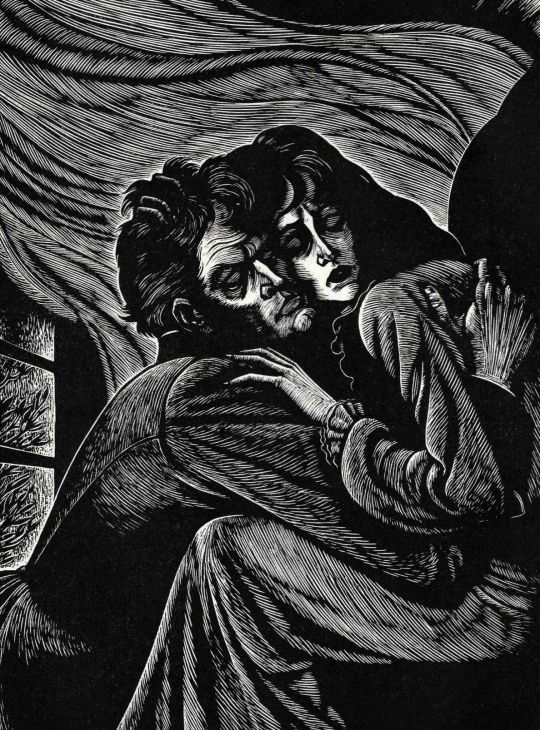
This illustration by Claire Leighton, depicting her at age twelve:
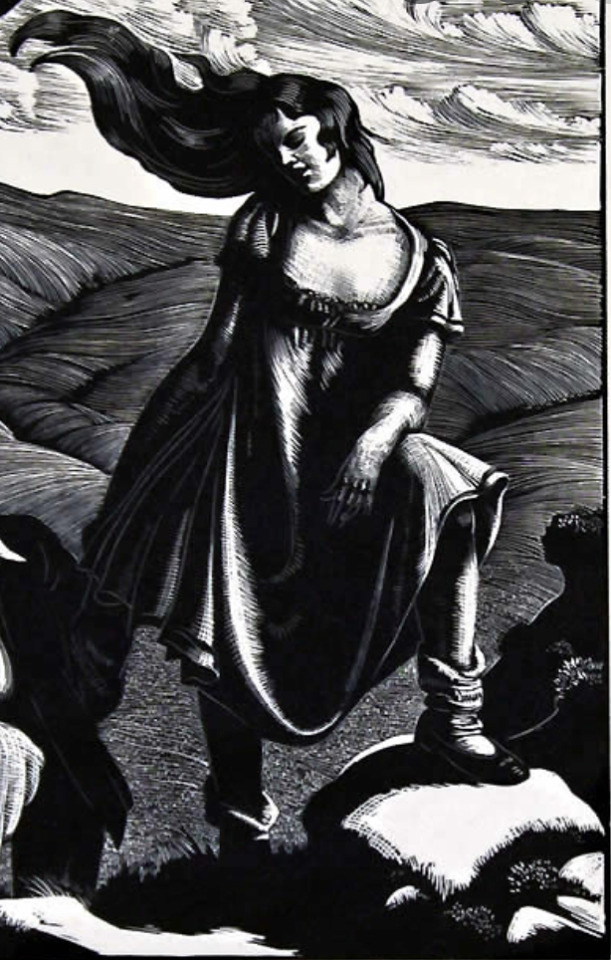
This illustration by Christian Birmingham, also of Cathy as a child:
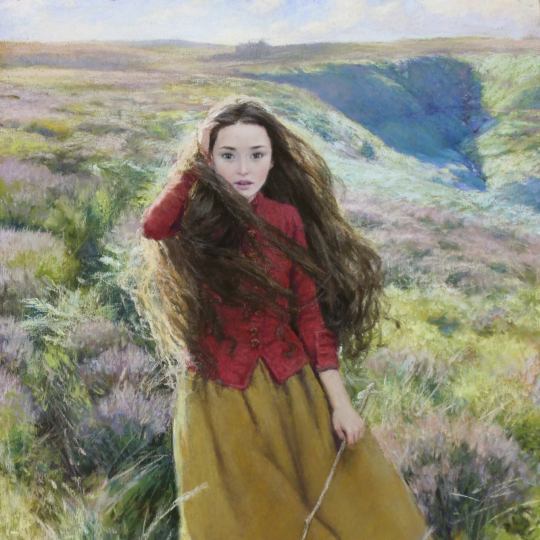
This illustration by Robert McGinnis:
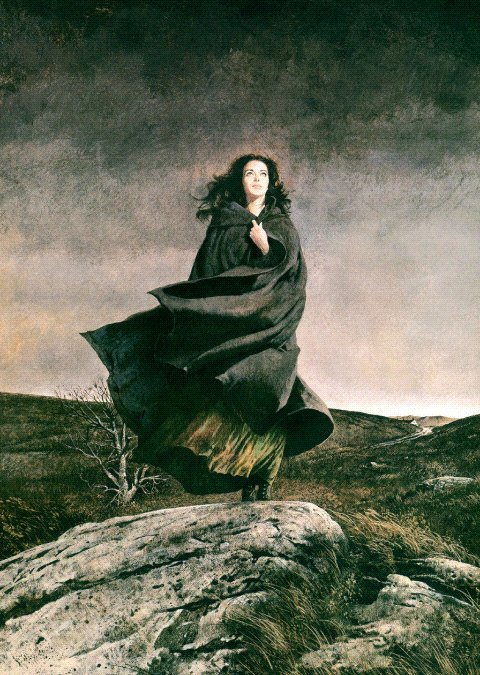
These illustrations by Rovina Cai:

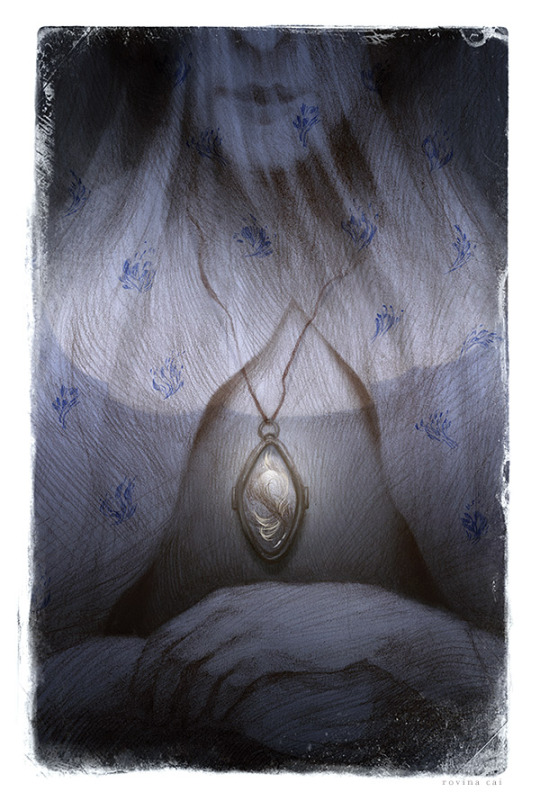
This symbolic illustration by Rosalind Whitman of Heathcliff's grief and yearning:
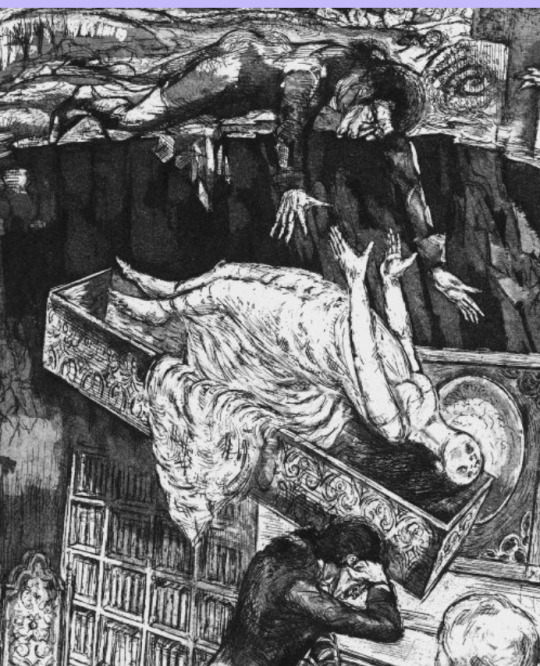
Merle Oberon in the 1939 film:
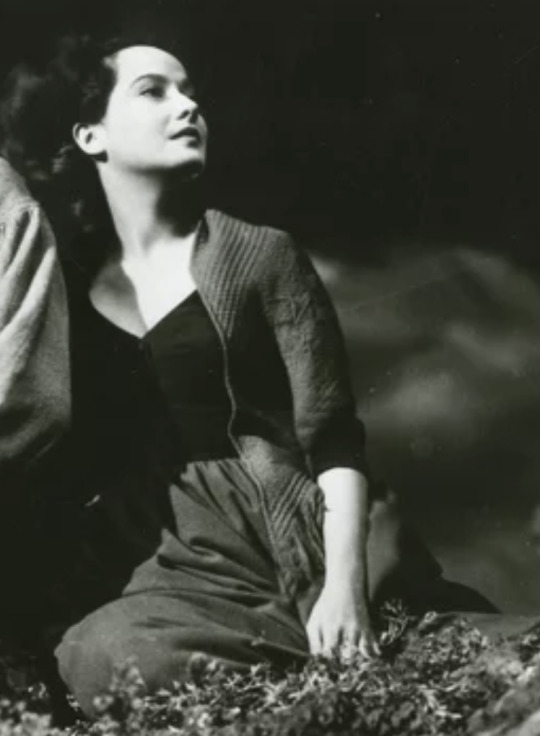
Kay Adshead in the 1978 BBC miniseries:

Juliette Binoche in the 1992 film:

Orla Brady in the 1998 Masterpiece Theatre version:

Charlotte Riley in the 2009 miniseries:
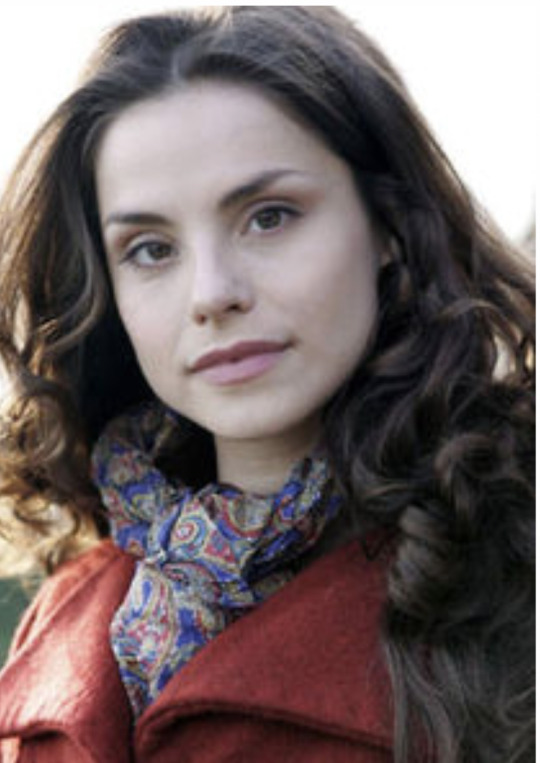
Kaya Scodelario in the 2011 film:
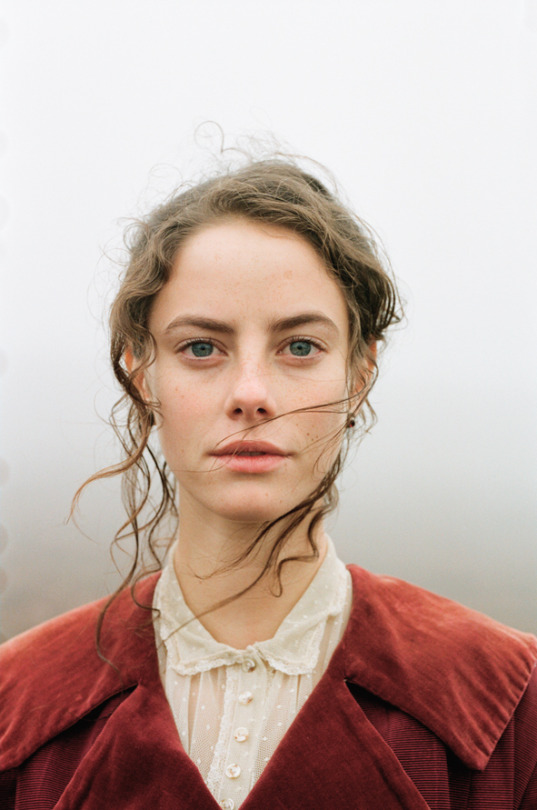
#character ask#wuthering heights#catherine earnshaw#emily bronte#literature#ask game#fictional characters#tw: abuse#tw: death
36 notes
·
View notes
Note
OBSESSED with your timeloop AU and your last post about made me thinking… When Pete kissess Vegas, would he remember all the timeloops? And in case that timeloop fails for any reason, would in the next timeloop Pete be aware of all of them and because of it still act as naturally as possible because he'd conclude pretty soon that if he gets involved with Vegas too soon the timeloop would fail? So in the last timeloop, things go perfectly and when everything is done, Pete tells Vegas that he remembers all the loops but didn't tell him sooner because it would mess things up and in the end they are the only ones who know the entire truth and it additionally bonds them.
Sorry for lenghty ask, I'm just really curious 🤗
OOH THAT'S SUCH AN INTERESTING SCENARIO!!!!!!!
i gotta admit i haven't really thought about a proper resolution for this entire time loop AU yet, mostly because it's just something rattling around in my brain with no real purpose, and now im a bit torn because part of me REALLY LIKES the idea of pete remembering all the timelines after kissing vegas (sort of like TRUE LOVE'S KISS SFJKSHFKSG) and having to sort of guide him into making the right choices without telling him that he knows for everything to go well, but another part of me (the overdramatic hoe one) is like.. WHAT ABOUT MORE PAIN
because i also kinda like the idea of paralleling the original timeline, so i was thinking something like.. after pete kisses vegas they end up having sex (and yeah, vegas should probably know better but he is weak, and tired, and desperate, and needs-wants-misses pete like oxygen), but it only makes the situation worse for pete, because while something in him tells him that this is RIGHT, that this is how things are supposed to be, he still doesn't remember all the different timelines, he just has these pieces of memories that are and aren't his own at the same time, so he keeps being incredibly confused until he breaks down, like in the show, and vegas is horrified to learn what the constant resets are doing to pete, because he had no idea
so vegas ends up explaining to pete what's happening, hoping it would help him, but pete needs time to process everything, and vegas vows not to fail and reset the timeline again, even if he knows that it could mean pete doesn't end up loving him. it's like the ultimate sacrifice he is willing to make if it means pete won't be suffering like that anymore. turns out he actually manages to do things right, the conflict between the main and minor family still kinda happens, that's inevitable, but with kim's help vegas manages to convince kinn and porsche about what's happening, and the only casualties in the end are kan and korn. and im not sure about the circumstances, but basically what i was thinking it could happen is that vegas STILL gets shot in front of pete, and the moment pete is crying over vegas' body, THAT'S when all the memories of all the different timelines (even the original one) flood pete's mind
of course this time vegas survives and we still get our hospital scene, the only differences are that vegas rightfully steps up as the head of the minor family, while kinn and porsche control the main one, and that pete tells vegas he remembers everything
ANYWAY IT DOESN'T MATTER HOW THINGS GO, IN THE END THEY LIVE HAPPILY EVER AFTER AND THAT'S ALL THAT MATTERS
#i.. kinda ended up hijacking your message and rambling by myself IM SORRY ;;;;;;;#my mind just gets out of control sometimes#but i hope you know your message made me incredibly happy!!!!!!#and please don't apologize you can send me all the lengthy messages you want!!!!!!#thanks for liking my silly time loop AU and for chatting with me about it!!!!#vegaspete#m: ask#lynx-paw
43 notes
·
View notes
Text
been wanting to watch the thelma film since i saw the trailer for it innnn 2017? so i finally checked it out the other day
i ultimately think i need to rewatch it and re-examine a lot through the religious/religious upbringing lenses.
i don't remember the trailer a ton but i do think i remember more bizarre or bigger displays of power in it? so it was a tad disappointing that they seemed to use ALL the cool surreal stuff there while the rest of the film was more subtle
BUT.................... those subtleties were actually really intriguing and why i need to rewatch
that's kinda the common theme, any criticism i have can be countered with BUT maybe that's what they were actually going for 🤔
like cool the focus is on gay shit, but i didn't really feel any chemistry between thelma and anja. BUT. maybe that's the point, because it's implied that anja only wants thelma because thelma is influencing her. so no, they don't need to really have anything in common or anything to attract anja to her. you could assume there's some stuff. but maybe there isn't supposed to be any.
i'm torn about the dad. on one hand i do think he was trying to help in the only ways he felt he could? because no matter how much thelma would train to get her powers under control, any subtle subconscious Want is bound to be a danger, esp given what's already happened. but on the other hand idk it would've been interesting to see if there was a different way.
AND ALSO i saw some theories that the dad also has some of those powers and he's actually the one who caused the brother's death and the mom's attempt, and his influence is what's keeping thelma's grandma so heavily drugged etc. i'm actually really intrigued by that and i can see part of it coming into play.
if so i then wonder how much his and thelma's different desires can conflict, because i was thinking about her breaking down and telling him she had a cigarette or alcohol etc and how he relented and said it's okay to do once in a while. knowing what he knows about her, that wasn't very wise? or maybe it was fine, because he was trying to keep her content. but i feel that was the start of the subtleties of thelma getting her way. so... would she be getting her way like that if he had his own powers too?
there's another angle as well about... what's real/what isn't. the thing with the brother's death is the mom did something incredibly dangerous anyway by leaving a baby unattended in the bath. i honestly can see an angle where he had died naturally and someone's powers reconstructed the whole story.
also dreams! lots of bad things happen while thelma's dreaming. so i guess there really isn't a great way to control her powers with that in mind.
i'm not totally sure why her dad had to burn, like i know it was a callback to the candle thing (him showing her what hell feels like as a kid) but i really... don't think he was all that awful all things considered, going off surface level anyway? but i know that she was always going to be repressed and restrained while he lives. so i guess she made a choice between him and anja? but then why'd she heal her mother? i'm not... totally sure about how she feels about either parent in the end or why.
ambiguous ending! is anja with her because thelma wants her to be or because anja wants to be? i think it's thelma's powers, given the glimpse of wanting anja to kiss her neck and suddenly it happens, same with how anja's fashion has changed to be more like thelma's. thelma's making her into her own toy.
i feel like a lot works better on a metaphorical level than an actual superpowers level, like i still don't... Get how thelma learned to control these things better in the end. i guess it was more the choice, and therefore she gained more control by accepting herself more fully and being able to more clearly understand herself and how it all works, rather than repression causing issues.
basically a good movie but could've been shorter maybe, and probably better on rewatch
0 notes
Note
So as a TC fan you must be happy with Flux so far
Very much so, yes.
I was a little hesitant during the first episode because it had such a breakneck pace and in general, I do feel like there was no need to introduce basically the whole cast in that episode. Like, Vinder? Williamson? Claire? None of them really needed to appear for the story that The Halloween Apocalypse was telling. That said, I enjoyed the episode a lot, and I enjoyed War of The Sontarans.
The Doctor's gambit where she offers information on herself to them only to reveal who she is was something that I don't think I've ever seen her do before but it's such a great trick. The line "Men like you make me wonder why I bother with humanity." Cut me deeper than I was expecting. It definitely echoes Harriet Jones, except this time The General isn't likeable at all and has no heroic deeds under his belt, nothing to justify it. But the most interesting part of that episode was the setup for the next one, with The Mouri and the planet Time. When the lantern creatures called Time "evil" I got chills.
Once, Upon Time may just be a big flashback episode, and I know The Doctor's flashbacks are the only ones that really matter, (except Maybe Vinder's, and those are pretty damn compelling, I won't lie) but that doesn't mean I don't love em. Getting to see Jo Martin again, getting to witness The Doctor during their time with The Division...it's all spooky as hell. And I didn't notice until this episode but Swarm changed actors when he escaped his prison...and he said "renewed at last." So...Swarm totally regenerated, right? Not sure what to make of that, but between this and Azure seemingly having been under the effect of a Chameleon Arch...I wonder about the true nature of the Ravagers. Anyway, this one was fascinating. But it was also in this one that I really noticed just how awful The Doctor has been to Yaz during Flux. I was legit mad at her, she's mistreating Yaz for being confused about things The Doctor won't tell her about, and I'm not here for it.
Village of The Angels is, and I don't say this lightly, the scariest that the Weeping Angels have been in years. It is easily their best story since Blink. The atmosphere and the way they're used, just. It all works really well. Claire is a delight and so are Peggy and Jericho. I haven't really talked about Vinder or Bel yet but I adore them both. I know there's a theory that they're The Doctor's birth parents, but like...that doesn't seem likely. At this point Swarm and Azure are more likely to be The Doctor's parents, if anything. Dan is someone I like more and more with every episode, and getting to see how The Flux has torn the universe apart also helps, especially now that time has begun to "run wild." I really dig the idea that Time is it's own force of nature and that The Division are the ones who decided to try and "tame" or control it. Speaking of them, I also enjoy the Rogue Angel's character and the way they flesh out this overarching villainous force. From their warnings to the ultimate betrayal, this is a solid story and it does something new with the angels. I really like the Rogue Angel as a character. Also, obligatory shoutout to that friggin cliffhanger.
Then again, it didn't amount to much, but that's okay. Survivors of The Flux is still such a sledgehammer to the face for everything it reveals. On one hand we have a neat storyline about Yaz, Dan, and Jericho traveling the world. We have Kate Stewart going full Doctor and offering the Grand Serpent a choice (little disappointed that he's just working with Sontarans but whatever) and the best part of the episode, The Doctor's scenes in....what I assume is Tecteun's Tardis? Yeah, we need to talk about her. What a villain, and what a performance. Seriously, this is one aspect which makes me very sad that we couldn't get a full ten episodes for Flux, because they keep introducing badass Division operatives that I want to know more about and then killing them off immediately. (Gat is underrated, by the way.) Tecteun is such a powerful presence and is very well characterized and just, everything about her. She's just as much of a monster as we all thought, but I cannot get over Barbara Flynn's performance and yes, Chibnall's writing as well. I so wish she'd gotten another episode or two, because her potential to stand as a rival with a unique dynamic to The Doctor...it's limitless. Every scene they shared captivated me, even before I knew who she was - though I kind of suspected it from the start.
I don't know if The Doctor's going to get her memories back in the next episode, but the trailer sure makes it seem like it. At this point, I have to wonder if The Doctor isn't a Ravager them-self, based on the title and how the Chameleon Arch was used on them. But if that were true, why did The Child appear as a human in the Matrix? It could have just been another visual filter, but The Fugitive Doctor looked human too. Either way, there's some connection between The Doctor and the Ravagers and I am now more sure than ever that they come from The Doctor's original universe, even if the Solitract Theory is probably dead at this point. We know where The Flux came from now. It's all a matter of reversing it. Again, not thrilled that the Sontarans are making a comeback, I kind of feel like we have enough to focus on, but oh well. Either way, you're right. As a fan of the Timeless Child storyline, I have been well fed by this season. And considering how popular Flux has been, I think this really goes to show: If you start to tell a story and the fans hate it...the solution isn't to erase the story you've already started telling and segue into a new one. Finish the story you've started to tell, because it pays off, and the alternative is Rise of Skywalker to awkwardly negate everything you have so far.
#Doctor Who#Doctor Who Flux#Doctor Who Spoilers#The Doctor#The Thirteenth Doctor#Tecteun#Survivors of The Flux#Once Upon Time#Village of The Angels#War of the Sontarans#Swarm#Azure#The Division
9 notes
·
View notes
Note
so what's Callum's story supposed to be? i think it's about him becoming a mage, but he barely learns any magic. why didn't tdp spend more time on his arc learning spells?
Because Callum’s arc is not about him becoming a mage. That might be his goal, but not his arc. These are easy to confuse, and though there might be some overlap between a goal and an arc, the difference is not trivial.
Here’s an example of what I mean: In the first Thor movie, he begins the story believing that might makes right. When he’s banished to Earth, his goal--the thing he wants--is to get back to Asgard and become King. He eventually does, but right now the thing he needs is to learn humility and compassion, to put others before himself. Only then does he overcome the lie he believed and become worthy enough to wield Mjolnir and return home.
A character’s arc (at least a positive one like Callum’s) is always about said character overcoming a falsehood they believe either about themselves or the world.
I’ll write more about this in a later meta, but I’ll give a run-down of what I mean:
The lie that Callum believes about himself is that his “destiny is already written.” And he’s had trouble finding his. We see him fail at sword fighting, and even though that same scene shows that when he’s properly motivated he can almost execute a sweep-the-leg, he dismisses himself as a lost cause.
He thinks he’s bad at all these princely tasks because he wasn’t born a prince, and he thinks that until he finds his “thing,” he won’t be able to find his place in the world.
And then, of course, he does (at least in his mind).
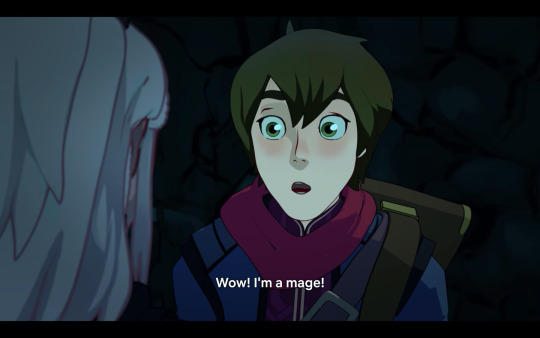
But here’s the rub--becoming a mage is the thing he wants. But overcoming his lie, and learning that he is free to make his own destiny, is the thing he needs.
So, because magic came so easily to him, Callum immediately latches onto it as his destiny.
Callum: “Ralya, princes are supposed to be good at things...but I’ve always been bad at, well, everything. So when I tried that spell, I was sure that I’d end up on fire or covered in spiders...but it worked. And then you called me a mage, and that felt right.”
For now, Callum has the thing he wants, so at least for the time being, that tempers his feelings of inferiority and keeps him from having to confront the lie he believes. For now, he thinks he’s a natural when it comes to doing magic, and so he was always meant to be a mage.
But eventually, the lie catches up to him--he has to destroy the Primal Stone, and when he turns around to try and learn magic from Lujanne, he discovers that:

He hits a roadblock. Suddenly he’s told that magic is not his destiny, that he’s not a natural at magic. Literally, not--he wasn’t born with magic inside him.
But he’s undeterred. Magic came easily to him before, maybe connecting to the Arcanum would be no different.
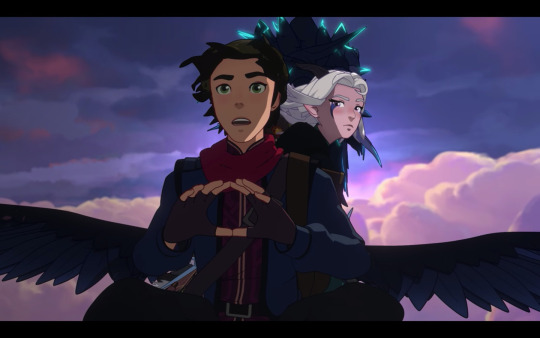
Callum: “[Lujanne] said you had to connect to the Primal, and that magical creatures are born with a connection. But I don’t see why I can’t make my own connection.
Yet, later that episode he hits something of a rock bottom--he ventures into a storm trying to make a connection to the Sky Primal, and it’s almost a disaster. He realizes that it was an idiotic move, and that it’s not going to come to him as a sudden burst of insight deep in a storm.
But he also now knows that learning magic is hard. That if he wants to become a mage again, it will take hard work, and he’ll have to trust that eventually, he’ll get it.
His belief in the lie does get a hold of him--if even magic is not his destiny, then what is? He starts thinking that he can’t do anything, that he can’t help anyone in a combative effort, and that he is weak, both of physical body and of character.
And in that moment of self-doubt, it leads him to try the one thing he knows he can do.
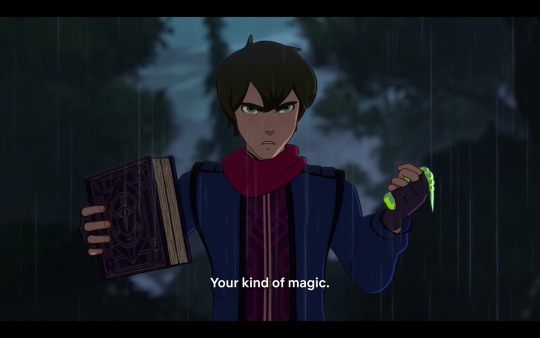
And he’s right, he can do it. It’s even easy for him to do this type of magic.
Before, magic had come easy, and this made it feel right. This time it felt easy...and wrong.

Dark!Callum: You tried Dark Magic for the first time. No one expects that to be easy.
Callum: But that’s the thing. It was easy. Too easy. Even though I know it’s wrong.
He comes face-to-face with himself--a vision that represents a lie-burdened Callum. Aaron and Justin weren’t exactly subtle that this was supposed to be the kind of person Callum would eventually have become if he kept believing the lie.

This is where he has to face the ultimate choice--on the one hand, he can become a mage.
But on the other, he can choose to be free.
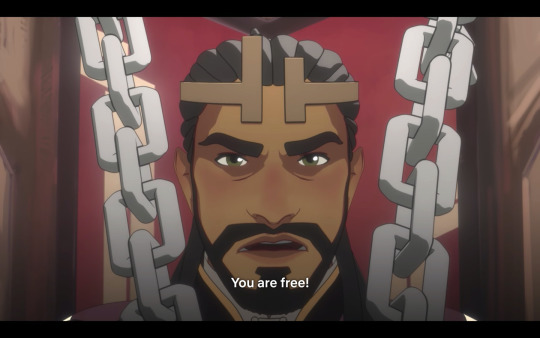
The choice he makes is a hard one—Callum doesn’t have an Arcanum, and Dark Magic was his only other alternative. From all he knew, he had to turn away being a mage for good.
And it’s a price he’s willing to pay.
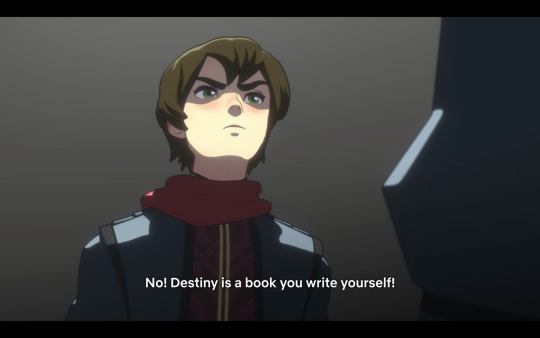
And this proved to be the final piece he needed--asserting this radical freedom--to finally understanding the Sky Arcanum.
Yet the next season isn’t any easier on him. It proves to be the most physically demanding one yet. His journey ups the stakes, he’s kept off-balance, and new challenges and temptations emerge to shake his confidence in the truth he learned.
Callum learns he can’t rely solely on his magic to survive in Xadia. He has to push himself just to keep up with Rayla. And she trusts that he can, which spurs him to keep moving, keep testing the limits of what he can do.
So that when the moment of truth comes...he’s ready.
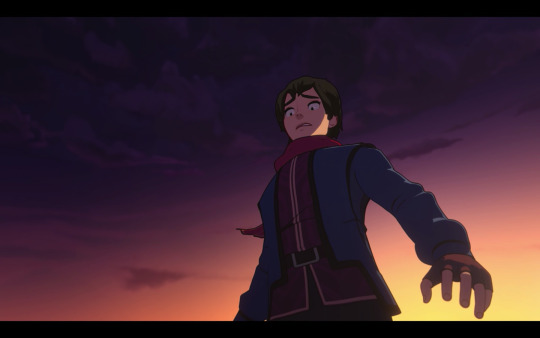

He leaves behind his sketchbook. His jacket is torn to shreds. When we see him again, the runes on his arms feature prominently with his Katolian red scarf and shirt. In s1 he doubted that he could be a prince. In s2 he doubted he could be a mage.
But here, we see he has chosen to be both a mage and a prince, his destiny firmly in his hands.

There you have it--what Callum’s story is supposed to be. It’s a story that involves magic, but ultimately that’s not what it’s about.
It’s a story about destiny...and freedom.
#callum#rayla#rayllum#a little bit#lujanne#harrow#s1#s2#s3#primal magic#dark magic#destiny is a book you write yourself#sky magic#tdp#the dragon prince
50 notes
·
View notes